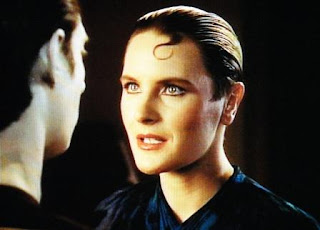
7. How did the famous A.M. Turing suggest that we identify if a computer is intelligent (113, see cartoon at left)?
8. Why have people been wary of intelligent machines for such a long time? How is it that AAI-inspired science fiction cannot stay away from classically religious themes of human degradation, even sin?
9. Why is conversation so important to our attribution of intelligence (113-114)--why do you go to a job interview, why did Turing frame his test as he did?
10. How does Gelernter update the Turing Test (115)? One point on the next quiz to first person to answer this via email: how did Gelernter inadvertently achieve fame some years ago, and in the process lose part of his hand?
11. According to Geraci, what is the greatest problem facing strong AI (116)? How might this topic be more religious than scientific; how would Buddhism characterize it (116-117)?
 12. Creative Challenge: suppose there are very intelligent robots. How would two robots frame a Turing Test for humans to determine if we are intelligent (see p. 117)? Might they conclude we are not and thus confirm various Biblical and film views that we are profoundly selfish?
12. Creative Challenge: suppose there are very intelligent robots. How would two robots frame a Turing Test for humans to determine if we are intelligent (see p. 117)? Might they conclude we are not and thus confirm various Biblical and film views that we are profoundly selfish?
13. Challenge: Given Data's revelation of "intimacy" with Tasha Yar in "Measure of a Man" (Star Trek: Next Generation), would you object to robot-human marriages (click the image at left for video clip)? Could we recognize robots, androids, as "made in the image of God"?
14. What is Geraci's view of how soon intelligent robots will arrive and what does he believe iis the principal barrier (117)?
15. What is artificial psychology (118)? How is it and AAI beginning to influence mainstream science textbooks, according to Geraci?
16. Is AAI limited to the United States (123)? Explain.

17. What is the "digerati culture" and what is Cybernetic Totalism (125) and why does Lanier view it as a threat to humanity?
 18. What was the sci-fi literary antecedent to Blade Runner? How would Geraci explain the staying power of this dark, apocalyptic film (127)?
18. What was the sci-fi literary antecedent to Blade Runner? How would Geraci explain the staying power of this dark, apocalyptic film (127)?
19. Super Challenge: Geraci claims that the "dualistic cosmology" of Blade Runner genre-films reminds us of Gnostic theology. Explain.
20. In his significant discussion of Phillip K. Dick's science fiction, Geraci suggests that "contemplation of artificial intelligence provides the atmosphere in which contemporary moral thought becomes possible" (131).
21. Why do we reach a better understanding of ourselves when we deeply explore the theological dimensions of technology (last part of chapter)?





 18. What was the sci-fi literary antecedent to Blade Runner? How would Geraci explain the staying power of this dark, apocalyptic film (127)?
18. What was the sci-fi literary antecedent to Blade Runner? How would Geraci explain the staying power of this dark, apocalyptic film (127)?